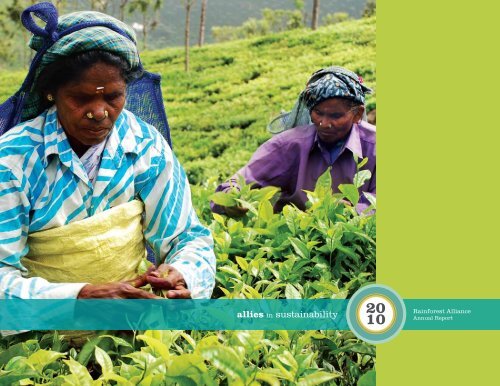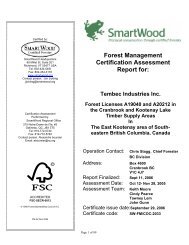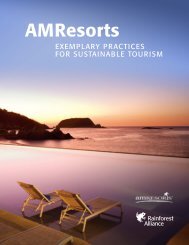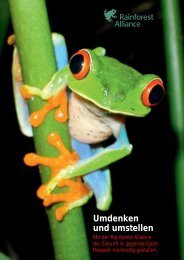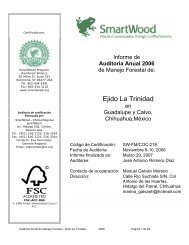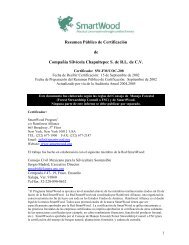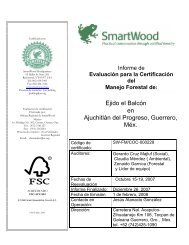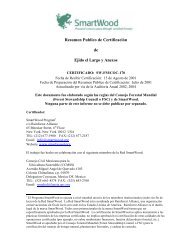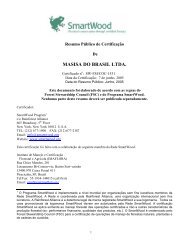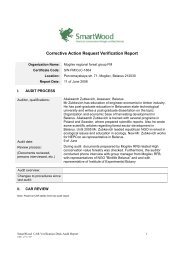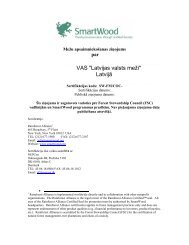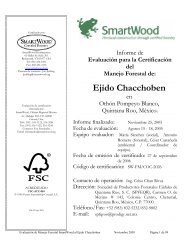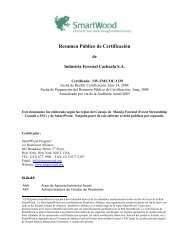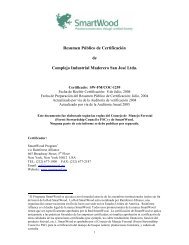Annual Report - Rainforest Alliance
Annual Report - Rainforest Alliance
Annual Report - Rainforest Alliance
Create successful ePaper yourself
Turn your PDF publications into a flip-book with our unique Google optimized e-Paper software.
allies in sustainability<br />
<strong>Rainforest</strong> <strong>Alliance</strong><br />
<strong>Annual</strong> <strong>Report</strong>
<strong>Rainforest</strong> <strong>Alliance</strong> Board of Directors<br />
Daniel R. Katz,<br />
Chair<br />
WenDy GoRDon,<br />
Vice Chair<br />
PeteR M. SChulte,<br />
treasurer<br />
labeeb M. abbouD<br />
beRt aeRtS<br />
aDaM albRiGht<br />
DR. noel bRoWn<br />
Daniel Cohen<br />
RoGeR DeRoMeDi<br />
DR. FRanK J. DottoRi*<br />
DR. KaRl FoSSuM<br />
henRy e. JuSzKieWiCz*<br />
SuDhaKaR KeSaVan<br />
MaRy StuaRt MaSteRSon<br />
bRenDan May<br />
eRiC RothenbeRG<br />
KeRRi a. SMith<br />
MaRtin tanDleR<br />
The <strong>Rainforest</strong> <strong>Alliance</strong> is helping to<br />
arrest the major drivers of deforestation<br />
and environmental destruction<br />
by ensuring that millions of acres of working forests, farms, ranchlands and<br />
hotel properties are managed according to rigorous sustainability standards.<br />
We link sustainably managed businesses to conscientious consumers, who<br />
identify their goods and services through the <strong>Rainforest</strong> alliance Certified<br />
seal and <strong>Rainforest</strong> alliance Verified mark. our success in more than<br />
70 countries around the world demonstrates that a sustainable approach,<br />
which protects the environment, ensures good working conditions and<br />
provides businesses with the tools to operate efficiently and responsibly,<br />
can help them to thrive in the modern economy.<br />
DaViD WaSSeRMan<br />
anneMieKe WiJn<br />
alan WilziG<br />
*term ended during fiscal year 2010
Tea farmers in Kenya. Bird watchers in<br />
Nicaragua. Biologists in India. Coffee<br />
drinkers in Paris. CEOs in Chicago.<br />
Grade-school students in New Jersey.<br />
The <strong>Rainforest</strong> <strong>Alliance</strong> is the sum of our<br />
parts. We are the millions of people around<br />
the globe who are helping to determine and<br />
realize our collective vision of a sustainable<br />
future—one that improves lives, increases<br />
livelihoods and protects our planet.<br />
This year our annual report shines a light on allies working in Asia,<br />
Africa, and Latin and North America. They include…<br />
• Conservation scientists and spouses T.R. Shankar Raman<br />
and Divya Mudappa, who have been working with a small<br />
team of researchers for more than 15 years to conserve<br />
biodiversity in India’s Western Ghats.<br />
• The Asociación de Castañeros de la Reserva Nacional<br />
de Tambopata, a Brazil nut–producers’ association whose<br />
members are learning how to increase the profitability<br />
of their business, which is giving them the incentive to<br />
conserve their ecologically valuable forests.<br />
• Hotel owner Max Gunther, who after learning of Puerto<br />
Maldonado’s extraordinary biodiversity, pushed the<br />
Peruvian government to create a large nature reserve<br />
adjacent to his property.<br />
• Maanasi Garg, a fifth-grade student at the Susie E. Tolbert<br />
Elementary School in Florida, a recycling ambassador<br />
and participant in the school’s river cleanup project,<br />
who told her teacher, “I really like how it feels to help<br />
rainforests and animals.”<br />
The commitment, integrity and passion demonstrated by these<br />
individuals—along with our allies in more than 70 countries<br />
around the world—mean that 157 million acres of forest and<br />
1.24 million acres of farmland sustainably yield wood, nuts, coffee,<br />
tea, cocoa, fruit, ferns and flowers. On these certified lands, workers<br />
and their families enjoy clean drinking water, decent housing,<br />
healthcare and education, while wildlife habitat is protected, soils<br />
and waterways are healthy, and the gasses that lead to climate change<br />
are absorbed. The hotel owners who work with us provide these same<br />
vital benefits to their employees, their neighbors and the Earth.<br />
Our allies in sustainability working in forests, fields and tourist<br />
destinations are linked to our allies in board rooms, stockrooms,<br />
classrooms and supermarket aisles by means of a vast and<br />
interconnected network—a supply chain that bridges oceans<br />
and spans continents. Because of their conviction and concerted<br />
support, consumers are now spending $12 billion a year on<br />
<strong>Rainforest</strong> <strong>Alliance</strong> Certified or Verified products and services.<br />
Paring down the list of deserving people and groups for this year’s<br />
annual report was daunting. In the end, we could provide only a tiny<br />
but representative sampling. One who is featured is Christian Mensah,<br />
whose response is indicative of the dedication and selflessness of our<br />
many thousands of allies around the globe. Mensah, who works with<br />
cocoa producers in Ghana, wrote us: “I am amazed that such an honor<br />
has been bestowed upon me. I am humbled by this recognition and<br />
quite surprised. I feel I have just been lucky to be recognized for doing<br />
something I have loved and developed passion for. Many thanks for<br />
recognizing my efforts in Ghana.”<br />
We ourselves feel honored to recognize Mensah’s work—and the tireless<br />
efforts of all our allies. We applaud their knowledge, their passion<br />
and their hard work, and we speak on behalf of the entire <strong>Rainforest</strong><br />
<strong>Alliance</strong> staff when we say that being part of an alliance that includes<br />
the likes of Christian Mensah is truly a privilege for all of us.<br />
Allies in Sustainability <strong>Annual</strong> <strong>Report</strong> 2010 page 1<br />
Daniel R. Katz<br />
Board Chair<br />
Tensie Whelan<br />
President
forestry<br />
Our Sustainable<br />
Forestry Work<br />
Relies on<br />
Individuals<br />
From All<br />
Walks of Life<br />
—members of indigenous communities,<br />
captains of industry, ecologists, activists<br />
and government representatives. Together,<br />
we are weaving a human ecosystem in<br />
order to conserve a delicately balanced,<br />
infinitely expansive, ever renewable<br />
web of biodiversity.
Castañeros Group Gains Marketing<br />
Savvy in the Peruvian Amazon<br />
Madre de Dios in southeastern Peru is one of the world’s most productive Brazil nut–producing regions.<br />
eaching up to 165 feet<br />
(50 meters), the trees tower<br />
over some of the Peruvian<br />
Amazon’s most biodiverse<br />
forestlands. The country’s<br />
forestry department awards concessions<br />
to local Brazil nut harvesters, called<br />
castañeros, for the management of<br />
these lands. While the harvesting of<br />
Brazil nuts provides more than half the<br />
yearly income for thousands of families<br />
in the region, the Peruvian Amazon is<br />
threatened by the conversion of forest<br />
to farmland and cattle ranches, as<br />
well as the construction of a transoceanic<br />
highway that will eventually<br />
link Brazil to the Pacific Ocean by<br />
traversing this area of Peru.<br />
Because it’s critical that the castañeros<br />
have both the know-how and the<br />
incentive to maintain their harvest<br />
areas’ productivity, the <strong>Rainforest</strong><br />
<strong>Alliance</strong> has been working with<br />
the Asociación de Castañeros de la<br />
Reserva Nacional de Tambopata<br />
(ASCART)—a small but influential<br />
Brazil nut–producer’s association—<br />
to maximize the castañeros’ bargaining<br />
power, market the nuts they collect<br />
and manufacture value-added products<br />
such as health snacks.<br />
“We realized that we needed<br />
to strengthen our organization in<br />
order to gain advantages in the<br />
commercialization of the Brazil nut<br />
and increase our profitability,”<br />
explains ASCART vice president<br />
Vilma Zegarra. “Our first challenge<br />
was to manage our budget and<br />
improve the legal status of our<br />
organization.” As a result of the<br />
<strong>Rainforest</strong> <strong>Alliance</strong>’s work with<br />
ASCART during the past two years,<br />
members have increased their income<br />
by 30 percent, from an average of<br />
$885 to $1,147 per person, giving<br />
them the incentive to conserve the<br />
85,174 acres (34,469 hectares) of<br />
Amazonian forestland.<br />
Allies in Sustainability <strong>Annual</strong> <strong>Report</strong> 2010 page 3<br />
forestry f
Championing the Cause for<br />
Vermont’s Foresters<br />
Ben Machin is concerned that Forest<br />
Stewardship Council (FSC) certification may<br />
be at a crossroads in Vermont, challenged<br />
by environmental and economic pressures<br />
including the availability of inexpensive<br />
wood harvested overseas, the fragmentation<br />
of forestlands, a depressed housing market,<br />
erratic weather conditions and an inconsistent<br />
supply of certified wood from local forests.<br />
In response, Machin has forged an alliance<br />
among his firm, Redstart Consulting—<br />
an FSC-certified land manager for a<br />
group of private landowners—and several<br />
other consulting forestry firms. The new<br />
organization, the Forest Partnership, will<br />
aggregate a steady supply of FSC-certified<br />
wood from local forests by developing a<br />
statewide network of foresters and small<br />
landowners. Machin is hoping that by<br />
supplying manufacturers with certified<br />
wood that reliably meets their specifications,<br />
small landowners throughout the state will<br />
be able to more successfully access the<br />
marketplace and achieve a premium price.<br />
Machin is also encouraging manufacturers<br />
to market their certified products more<br />
effectively. “Those of us committed to FSC<br />
certification need to explain its significance<br />
in human terms,” he says, which is why he will<br />
soon be crisscrossing the state, camera and<br />
notebook in hand, to gather the stories of the<br />
foresters, loggers and landowners behind the<br />
FSC-certified trademark.<br />
Carving a Message for Bolivia’s<br />
Certified Forests<br />
For the past three years, sculptor Juan Bustillos, cofounder of Manzana Uno—a leading art gallery<br />
in Santa Cruz, Bolivia—has been spearheading the International Gathering of Sculptors Working<br />
in FSC-Certified Wood.<br />
uring the weeklong<br />
event, artists<br />
from around the<br />
world gather to<br />
create monumental<br />
sculptures crafted<br />
from certified wood and to introduce<br />
the public to the benefits of<br />
sustainable forest management.<br />
Bustillos, who works with both<br />
certified and salvaged wood, takes<br />
seriously his responsibility to<br />
conserve forests. “I imagine that<br />
due to the nature of artists—their<br />
sensitivity to their surroundings and<br />
their relationship with the public—<br />
they would be among the first<br />
members of society to recognize<br />
the importance of protecting the<br />
environment, and they would<br />
encourage other individuals to do<br />
the same,” notes Bustillos.<br />
Bolivia is among the top ten most<br />
biologically diverse countries on<br />
Earth, with 2,194 known species<br />
of amphibians, birds, mammals<br />
and reptiles, and more than<br />
17,000 species of plants. Yet<br />
Bolivia’s forests are threatened by<br />
oil and gas development, illegal<br />
logging, the over-harvesting of<br />
selected species, forest fires and<br />
commercial agricultural expansion.<br />
Over the past decade, more than<br />
three million acres (1.5 million<br />
hectares) of the country’s forests<br />
have been FSC-certified for<br />
sustainable management, which<br />
bodes well for the conservation<br />
of Bolivia’s globally significant<br />
biodiversity.
Allies in Sustainability <strong>Annual</strong> <strong>Report</strong> 2010 page 5<br />
forestry f
Seeing the Forests and the Trees<br />
When the <strong>Rainforest</strong> <strong>Alliance</strong> needs a SmartWood auditor who is not only experienced but able<br />
to conduct certifications involving a large number of acres or stakeholders with conflicting interests,<br />
forestry consultant Keith Moore is often the person to lead the team.<br />
long-time resident of Haida Gwaii<br />
(the Queen Charlotte Islands of British<br />
Columbia), Moore has served on more<br />
than 60 different Forest Stewardship<br />
Council (FSC) audits for the <strong>Rainforest</strong><br />
<strong>Alliance</strong>’s SmartWood program. Among them was<br />
the largest FSC-certified forest in the world—13.6<br />
million acres (5.5 million hectares) managed<br />
by Alberta-Pacific Forest Industries Inc., in<br />
Canada. The complex audit process required a<br />
full review of the company’s forest management<br />
operations, interviews with more than 100<br />
people, including aboriginal and community<br />
representatives, and reviews of surveys sent to 200<br />
community members. Not only was the audit<br />
significant because of the acreage evaluated and<br />
the subsequent availability of responsibly produced<br />
wood, but it made Canada the world’s leader in<br />
FSC-certified lands.<br />
More recently, Moore conducted a SmartWood<br />
pre-assessment of 991,000 acres (401,000 hectares)<br />
in Australia for Gunns Limited. As Moore<br />
explains, “Much of Gunns’ estate is in Tasmania.<br />
That is a highly polarized environment with a<br />
long history of conflict, and Gunns Limited has<br />
been in the middle of it.” He also audited the<br />
NewPage Port Hawkesbury paper company’s<br />
forest in Canada, which has recently become<br />
controversial since the company announced a<br />
plan to burn wood from the forest to generate<br />
electricity in Nova Scotia, Canada.<br />
Reflects Moore: “I work with motivated people<br />
in companies that want to be leaders. FSC<br />
certification and the work of the SmartWood<br />
program rewards those companies for changing<br />
their practices and meeting high social and<br />
environmental standards. I think that collectively<br />
we’re making an important difference in the way<br />
that forests around the world are managed.”
n Borneo, for example,<br />
1.5 forested acres (0.6 hectares)<br />
frequently support more<br />
tree species than does all<br />
of North America. But<br />
during the 1980s and<br />
1990s Borneo’s forests were<br />
leveled at an unparalleled rate<br />
for the manufacture of garden<br />
furniture, paper and chopsticks.<br />
Illegal logging, the conversion<br />
of natural forests and oil palm<br />
extraction continue to drive<br />
deforestation in Borneo.<br />
Every month for the past five<br />
years, Indonesia has lost an<br />
average area of forest equal to<br />
115,000 US football fields.<br />
Under the direction of Peter<br />
Kristensen, the vice president of<br />
New Hope for Asia’s Ancient Forests<br />
The tropical forests in southeast Asia are among the most biologically rich in the world.<br />
corporate social responsibility<br />
and the environment, DLH—the<br />
world’s largest trader in tropical<br />
timber—is working closely with<br />
the <strong>Rainforest</strong> <strong>Alliance</strong> to ensure<br />
that the timber extracted by the<br />
company’s suppliers in northern<br />
Borneo is legally harvested, and the<br />
company is encouraging all of its<br />
suppliers to obtain full verification<br />
for their timber. The <strong>Rainforest</strong><br />
<strong>Alliance</strong>’s legality verification<br />
program supports the company’s<br />
efforts to demonstrate care and<br />
due diligence in their sourcing of<br />
wood and wood products. Such<br />
demonstration is particularly<br />
important in helping companies<br />
to reduce their risk of importing,<br />
exporting or trading illegal<br />
timber, actions which are<br />
punishable by law in the<br />
United States since the 2008<br />
amendment to the Lacey Act.<br />
“DLH realized early on that their<br />
access to European and United<br />
States markets would be dependent<br />
on increased supply of legally<br />
verified and sustainably certified<br />
wood,” points out Kristensen.<br />
“Little room will be left to<br />
companies operating on a ‘business<br />
as usual’ model. This is especially<br />
true in times of global downturn,<br />
when companies with foresight are<br />
likely to succeed.” DLH is working<br />
closely with the <strong>Rainforest</strong> <strong>Alliance</strong><br />
to promote legality verification<br />
across Borneo and around the world.<br />
Allies in Sustainability <strong>Annual</strong> <strong>Report</strong> 2010 page 7<br />
forestry f
farming<br />
<strong>Rainforest</strong> <strong>Alliance</strong><br />
Certified TM Farms<br />
Are Models<br />
of Cooperation:<br />
To produce high-quality crops, farmers rely on<br />
healthy soils, clean water, a happy, healthy and<br />
productive workforce and even the tiniest of<br />
allies—beneficial insects that help control pests<br />
naturally. Like these farms, our achievements<br />
are only possible through collaboration—with<br />
individuals, communities and companies that care<br />
as much about transforming agriculture as we do.
Coffee, Tea and Conservation<br />
in India’s Western Ghats<br />
For centuries, the inaccessibility and dense forests of India’s Western Ghats provided food and<br />
shelter for tribal peoples and habitat for wildlife including Asian elephants, Bengal tigers<br />
and lion-tailed macaques.<br />
ut the conversion of<br />
these verdant hillsides<br />
to coffee and tea<br />
plantations more than a<br />
century ago resulted in<br />
the fragmentation of one<br />
of India’s most biodiversity-rich areas.<br />
Within the plantations’ boundaries<br />
exist remnant natural ecosystems that<br />
act as refuges for many endangered<br />
and threatened species.<br />
Conservation scientists and spouses<br />
T.R. Shankar Raman and Divya<br />
Mudappa have been working with<br />
a small team of researchers for<br />
more than 15 years to conserve<br />
biodiversity in the Western Ghats<br />
region. Because many of the tea<br />
and coffee plantations border<br />
wildlife sanctuaries and national<br />
parks, Raman and Mudappa have<br />
found that it is essential to include<br />
plantations in their conservation<br />
efforts. “Crucial wide-ranging<br />
species impacted are animals like<br />
Asian elephants, leopards, gaur—<br />
the world’s largest species of wild<br />
cattle—and birds like hornbills.<br />
Besides the ‘corridor’ role of remnant<br />
forest, grassland, and other natural<br />
habitats in plantations, these<br />
remnants are ‘refuges’ for a wide<br />
variety of endemic [found nowhere<br />
else in the world] and endangered<br />
plant and animal species,” explains<br />
Raman.<br />
In 2008, the couple conducted their<br />
first audits of tea plantations and<br />
coffee farms for the Sustainable<br />
Agriculture Network (SAN), and<br />
in 2009, their nonprofit group, the<br />
Nature Conservation Foundation,<br />
joined the SAN. During the<br />
past year, Raman and Mudappa<br />
have been promoting <strong>Rainforest</strong><br />
<strong>Alliance</strong> certification in India and<br />
developing local indicators for the<br />
SAN standard. Farms that meet the<br />
standard qualify for the <strong>Rainforest</strong><br />
<strong>Alliance</strong> Certified seal.<br />
Allies in Sustainability <strong>Annual</strong> <strong>Report</strong> 2010 page 9<br />
farming f
A New Crop of Self-Sufficient<br />
Tea Farmers in Kenya<br />
The <strong>Rainforest</strong> <strong>Alliance</strong> first crossed paths with Peter Mbadi in 2006, when he was involved in a pilot<br />
project with Lipton and the Kenya Tea Development Agency (KTDA) to encourage smallholder tea<br />
growers to adopt more sustainable and profitable farming practices.<br />
ince then, Mbadi has<br />
continued to champion the<br />
<strong>Rainforest</strong> <strong>Alliance</strong> cause<br />
within the KTDA—an<br />
organization made up of<br />
560,000 smallholders—and introduced<br />
the Sustainable Agriculture Network<br />
standard to thousands of farmers, laying<br />
the groundwork for them to earn the<br />
<strong>Rainforest</strong> <strong>Alliance</strong> Certified seal.<br />
“The whole process of changing the<br />
hearts and minds of farmers in such<br />
a large and complex organization<br />
has been an enormous undertaking,”<br />
explains Marc Monsarrat, <strong>Rainforest</strong><br />
<strong>Alliance</strong> manager for East Africa<br />
and South Asia, “and Peter has been<br />
a wonderful driving force to make<br />
it happen.” Kenya produces around<br />
320,000 tons of tea each year and is<br />
the world’s largest exporter. The<br />
KTDA alone produces 60 percent<br />
of the country’s tea.<br />
Mbadi has also championed the<br />
introduction of farmer field schools,<br />
a training methodology that is<br />
helping KTDA farmers throughout<br />
the country to learn and adopt good<br />
agricultural practices. The farmers have<br />
been learning about the importance<br />
of frequent plucking, re-planting tea<br />
bushes, handling agrochemicals safely<br />
and ways to protect the environment.<br />
For instance, by simply removing<br />
eucalyptus trees that line riverbanks,<br />
farmers have been able to return the<br />
flow of water to dry riverbeds. As<br />
Mbadi explains, “The farmers now<br />
feel empowered and are disseminating<br />
their knowledge to other farms. This is<br />
really exciting to them. And we are all<br />
excited to associate with the <strong>Rainforest</strong><br />
<strong>Alliance</strong>, which promotes the economic<br />
and environmental improvement of our<br />
farmers and the country at large.”
Ghanaian Cocoa Farmers<br />
to Benefit from <strong>Rainforest</strong><br />
<strong>Alliance</strong> Certification<br />
In the 15th century, Spanish explorers<br />
brought back to Europe a drink made<br />
from cocoa beans. With its steady rise in<br />
popularity, cocoa was eventually introduced<br />
to Africa, where today, most of the world’s<br />
cocoa is produced. In Ghana, thousands of<br />
smallholders have been learning sustainable<br />
farming methods—to grow their cocoa in<br />
shade, provide decent working conditions<br />
for employees, monitor progress and make<br />
sound management decisions—thanks in<br />
large part to the efforts of Christian Mensah.<br />
Since 2008 Mensah has been working with the<br />
<strong>Rainforest</strong> <strong>Alliance</strong>’s Ghanaian partner group,<br />
Agro Eco-Louis Bolk Institute, where he has<br />
been charged with introducing the farmers to<br />
sustainable farming, preparing them to meet<br />
certification standards, training auditors and<br />
adapting the Sustainable Agriculture Network<br />
standard to local conditions. In addition, he’s<br />
been helping the farmers earn a premium<br />
for their product. This has meant introducing<br />
the government, which purchases all of<br />
the country’s cocoa, to <strong>Rainforest</strong> <strong>Alliance</strong><br />
certification and demonstrating its inherent<br />
environmental, social and economic value.<br />
As a result of Mensah’s leadership, in just over<br />
two years a total of 1,000 farmers in Ghana<br />
have earned the <strong>Rainforest</strong> <strong>Alliance</strong> Certified<br />
seal, another 7,000 farmers are in training and<br />
an additional estimated 12,000 farmers are<br />
slated to join the program in 2011.<br />
Allies in Sustainability <strong>Annual</strong> <strong>Report</strong> 2010 page 11<br />
farming f
Standing Out From the Herd<br />
Deforestation. Greenhouse gas emissions. Land degradation. Water pollution. Biodiversity loss.<br />
An estimated 26 percent of the Earth’s terrestrial surface is devoted to the grazing of livestock, and<br />
the problems associated with it are well documented.<br />
ortunately, with the<br />
2010 launch of a standard<br />
for <strong>Rainforest</strong> <strong>Alliance</strong><br />
Certified cattle farms,<br />
there is now a sustainable<br />
future in store for<br />
cattle ranches.<br />
The new standard was developed<br />
in collaboration with the Tropical<br />
Agricultural Research and Higher<br />
Education Center (CATIE), a<br />
Costa Rica–based nonprofit research<br />
institution where scientists have<br />
determined that cattle farms can<br />
indeed be integral aspects of healthy<br />
ecosystems, provided that farmers<br />
are engaged in practices such as<br />
planting shade trees and actively<br />
managing their pastureland and<br />
water resources.<br />
“The experience of working with<br />
the <strong>Rainforest</strong> <strong>Alliance</strong> has been<br />
wonderful,” reflects Muhammad<br />
Ibrahim, leader of CATIE’s Cattle<br />
Production and Environmental<br />
Management program. “Together,<br />
we have researched practical ways<br />
to improve biodiversity and water<br />
quality, and mitigate climate change.”<br />
The standard also ensures that<br />
cattle are well-treated and given<br />
access to pasture.<br />
While no cattle ranches have yet<br />
earned the <strong>Rainforest</strong> <strong>Alliance</strong><br />
Certified seal, a number of farmers<br />
have already begun working toward<br />
it. “It’s an honor to be linked to<br />
a standard that has the ability to<br />
change the way cattle production is<br />
managed,” Ibrahim notes. “Now, we<br />
need to prepare farmers and promote<br />
the standard so it is recognized by<br />
regional entities and authorities, the<br />
private sector and consumers.”<br />
Allies in Sustainability <strong>Annual</strong> <strong>Report</strong> 2010 page 13<br />
farming f
FoUR diReCTionS ToUR ComPAny<br />
Alfonso Muralles<br />
ixlú CommUniTy SCHool TeACHeR<br />
ASCART ViCe PReSidenT<br />
Vilma Zegarra<br />
Osmar Monzón<br />
ToURiSm ConSUlTAnT<br />
Ingrid Ayub<br />
TRoPiCAl AGRiCUlTURAl ReSeARCH And<br />
HiGHeR edUCATion CenTeR (CATie)<br />
Muhammad Ibrahim<br />
RAinFoReST AlliAnCe AUdiToR<br />
Keith Moore<br />
mAnzAnA Uno Co-FoUndeR<br />
Juan Bustillos<br />
GloBAl SUSTAinABle ToURiSm<br />
CRiTeRiA (GSTC)<br />
Kelly Bricker<br />
exPloReR’S inn<br />
Max Gunther<br />
SAlVAnATURA<br />
Guillermo Belloso<br />
ClimATe, CommUniTy And<br />
BiodiVeRSiTy AlliAnCe (CCBA)<br />
Joanna Durbin<br />
HoTel el Rey del CARiBe<br />
Araceli Dominguez<br />
el JAGUAR PRiVATe WildliFe ReSeRVe<br />
Georges and Lili Duriaux-Chavarría<br />
FoReST PARTneRSHiP Co-FoUndeR<br />
Ben Machin<br />
CoFFee FARmeR<br />
Wilson Sucaticona
kenyA TeA deVeloPmenT AGenCy (kTdA)<br />
Peter Mbadi<br />
SUSie e. TolBeRT elemenTARy SCHool<br />
AGRo eCo-loUiS Bolk inSTiTUTe<br />
Christian Mensah<br />
enViRonmenTAl ConSeRVATion<br />
TRUST oF UGAndA (eCoTRUST)<br />
Pauline Nantongo<br />
ViCe PReSidenT oF<br />
CoRPoRATe SoCiAl ReSPonSiBiliTy<br />
And THe enViRonmenT, dlH<br />
Peter Kristensen<br />
nATURe ConSeRVATion FoUndATion ReSeARCHeRS<br />
T.R. Shankar Raman and Divya Mudappa<br />
The <strong>Rainforest</strong> <strong>Alliance</strong>’s<br />
Global Reach<br />
The <strong>Rainforest</strong> <strong>Alliance</strong> works in more than<br />
70 countries, but not by ourselves. Our<br />
achievements are possible because of the<br />
partnerships we’ve forged with organizations<br />
and individuals in every corner of the Earth.<br />
Whether they are part of an organization<br />
leading workshops, training farmers,<br />
harvesting trees, managing hotels, plucking<br />
tea or teaching school, our allies—and every<br />
one of us—have a unique contribution to<br />
make. And like the species and communities<br />
we strive to protect, the <strong>Rainforest</strong> <strong>Alliance</strong><br />
can accomplish far more by working collaboratively<br />
than any single individual could<br />
ever hope to achieve on his or her own. We<br />
share this planet and its resources, and only<br />
by working together can we conserve them.
tourism<br />
Any Travel<br />
Destination’s Most<br />
Essential Ally is its<br />
Local Community<br />
—a healthy environment coupled with<br />
an economically thriving population.<br />
By ensuring that hotels and lodges respect<br />
local cultures, support local people and<br />
protect their surroundings, we are helping<br />
these businesses craft an economically<br />
and environmentally viable future. Travel<br />
destinations that are able to strike the<br />
balance between responsibility and<br />
profitability not only draw tourists, but<br />
keep them coming back.
The ABCs of a<br />
Sustainable Hotel<br />
For the eco-curious traveler, a stay at<br />
Hotel El Rey Del Caribe is part vacation,<br />
part education. Located in the heart of<br />
downtown Cancún, the 31-room bed and<br />
breakfast is known for its commitment<br />
to teaching guests and community<br />
members about sustainability. “Our<br />
hotel works like a school, so students<br />
and neighbors come once a week to learn<br />
about recycling and composting garbage,<br />
the benefits of native plants and other<br />
environmental subjects,” explains owner<br />
Araceli Dominguez.<br />
Hotel El Rey Del Caribe earned the<br />
<strong>Rainforest</strong> <strong>Alliance</strong> Verified mark in<br />
recognition of its commitment to social,<br />
economic and environmental responsibility.<br />
When it was first evaluated,<br />
the hotel met the sustainability criteria<br />
with a score of 76 percent. “A year later,<br />
thanks to [the <strong>Rainforest</strong> <strong>Alliance</strong>’s]<br />
workshops and training, we earned a<br />
97 percent,” explains Dominguez.<br />
In addition to its impressive environmental<br />
education work, the hotel has also invested<br />
in a solar water heater, a system to capture<br />
rainwater, a solar-powered clothes dryer<br />
and a composting system—all to reduce its<br />
environmental footprint.<br />
An Eco-Discovery in the Amazon<br />
In 1972, Max Gunther was working as a veterinarian, assisting sheep and cattle farmers in the Peruvian Andes.<br />
ut when a national<br />
land reform eradicated<br />
all large, private land<br />
holdings in Peru and<br />
converted most farms<br />
into worker-owned<br />
cooperatives, the demand for<br />
Gunther’s veterinary services<br />
was eliminated.<br />
Forced to find another way to earn<br />
a living, Gunther and a few friends<br />
purchased 260 acres (105 hectares)<br />
along the Tambopata River, where<br />
they built the Explorer’s Inn, an<br />
Amazonian eco-lodge that caters<br />
to birdwatchers and wildlife<br />
enthusiasts. While Gunther was<br />
not always aware of the extent of<br />
the natural riches surrounding<br />
his property, several visiting<br />
biologists quickly uncovered the<br />
area’s extraordinary biodiversity<br />
and encouraged the government to<br />
create a 13,590-acre (5,500-hectare)<br />
reserve around it. “Our lodge is<br />
situated within a pristine rainforest<br />
which has been untouched for<br />
35 years [and safeguards]<br />
abundant wildlife, including<br />
several endangered species,” says<br />
Gunther. “We also hold world<br />
records [for an area of this size],<br />
with 600 bird species and<br />
1,232 species of butterflies.”<br />
While he hasn’t always identified<br />
himself as a conservationist, today<br />
Gunther is deeply committed to<br />
ensuring the continued protection<br />
of the astounding natural resources<br />
surrounding his property. He has<br />
already installed solar panels and<br />
begun recycling, is educating guests<br />
about wildlife and conservation,<br />
and participates in a number of<br />
<strong>Rainforest</strong> <strong>Alliance</strong> workshops on<br />
sustainable tourism best practices;<br />
he aims to earn <strong>Rainforest</strong> <strong>Alliance</strong><br />
verification for his inn.<br />
Allies in Sustainability <strong>Annual</strong> <strong>Report</strong> 2010 page 17<br />
tourism t
Sustainable Tourism leader<br />
Sets a new Standard<br />
In the past 25 years, Kelly Bricker has guided<br />
river trips, conducted natural resource<br />
management research, taught, led tour<br />
groups, owned an ecotourism company and<br />
served as board chair for the International<br />
Ecotourism Society. All of her experience<br />
has led her to this conclusion: “Tourism<br />
emphasizes the power we have to influence<br />
positive change—to prevent social ills, boost<br />
conservation efforts and improve quality<br />
of life for individuals and communities that<br />
might not have other options.”<br />
This conviction propels her work as board<br />
president for the partnership for Global<br />
Sustainable Tourism Criteria (GSTC),<br />
the coalition behind the set of voluntary<br />
standards that any responsible tourism<br />
business should aspire to reach. Ultimately,<br />
these criteria aim to create what Bricker<br />
calls “a universal understanding” of<br />
sustainable tourism and, by ensuring<br />
that the industry is speaking with a united<br />
voice, increase the demand for sustainable<br />
tourism around the world.<br />
“The <strong>Rainforest</strong> <strong>Alliance</strong> has been a key<br />
player in this whole process,” Bricker says.<br />
“They’ve provided the technical expertise<br />
with regard to standard setting, the<br />
experience with certification programs<br />
in the Americas and a real understanding<br />
of the challenges inherent in developing<br />
certification programs.”<br />
Inspiring a Change of Attitude<br />
When the <strong>Rainforest</strong> <strong>Alliance</strong>’s sustainable tourism team is confronted with a particularly<br />
demanding assessment in Costa Rica, one of their first calls is to Ingrid Ayub.<br />
or five years, the consulting<br />
biologist and ornithologist<br />
has conducted verifications<br />
of tourism businesses<br />
and hosted seminars and<br />
workshops on sustainable<br />
tourism best practices for hoteliers,<br />
tour companies and their staff.<br />
According to Ayub, the most<br />
challenging part of her job is<br />
getting people to adopt new<br />
habits. It can be difficult to<br />
prepare businesses to begin keeping<br />
precise records, for example. But<br />
record-keeping is key to helping<br />
businesses take stock of their<br />
approach and understand how to<br />
implement improvements. “Even<br />
with limited economic resources,<br />
you can achieve a breakthrough<br />
with just a change of attitude,”<br />
Ayub observes.<br />
To illustrate her point, Ayub<br />
describes her visits to two tourism<br />
businesses in Talamanca, Costa<br />
Rica, working toward <strong>Rainforest</strong><br />
<strong>Alliance</strong> verification. “They<br />
worked extremely hard for four<br />
straight months,” she explains,<br />
“implementing low-cost but critical<br />
improvements.” Ayub visited each<br />
business five times to help them<br />
develop sustainability policies,<br />
work plans, record-keeping forms,<br />
emergency response plans and<br />
more. Concludes Ayub: “To see the<br />
change was inspiring.”
Fighting Poverty while<br />
Conserving Resources<br />
By creating jobs in rural areas; providing an<br />
alternative to illegal logging, poaching and<br />
slash-and-burn agriculture; and teaching<br />
travelers to be conscious of their environmental<br />
footprint, Alfonso Muralles believes that<br />
sustainable tourism can help local economies<br />
and protect ecosystems.<br />
That’s why he is ensuring that Four<br />
Directions—his family-run, <strong>Rainforest</strong><br />
<strong>Alliance</strong> Verified tour company based<br />
in Guatemala—supports the destinations<br />
along its tour routes through Mesoamerica.<br />
“We believe that by hiring local guides and<br />
[showing a preference for] community<br />
services, we are helping to reduce poverty<br />
and ultimately having a positive impact on<br />
people, wildlife and the environment,” reflects<br />
Muralles. “The <strong>Rainforest</strong> <strong>Alliance</strong> taught us<br />
that becoming more sustainable involves more<br />
than just community jobs—we must control our<br />
environmental impact and develop an efficient<br />
business management plan.”<br />
Allies in Sustainability <strong>Annual</strong> <strong>Report</strong> 2010 page 19
climate<br />
Ensuring Forest<br />
Conservation:<br />
A thriving forest ecosystem offers far more<br />
than the eye can see. Healthy forests protect<br />
water sources, prevent erosion and absorb the<br />
greenhouse gases that lead to climate change.<br />
Our climate program is helping to ensure forest<br />
conservation by giving communities the financial<br />
incentive to plant new trees in areas where deforestation<br />
has already occurred and by helping<br />
them adapt to the impacts of climate change.
Climate-Friendly Farming is the<br />
Next Step on Sustainability Path<br />
Asked to describe his work for the El Salvador–based nonprofit SalvaNATURA, Guillermo Belloso says he aims to<br />
“make the path toward sustainability easier for farmers.”<br />
or the past 11 years, technical<br />
assistance coordinator Belloso<br />
has been helping producers<br />
meet the social, environmental<br />
and economic standards of<br />
the Sustainable Agriculture<br />
Network (SAN), connecting farmers<br />
with buyers of <strong>Rainforest</strong> <strong>Alliance</strong><br />
Certified agricultural goods and<br />
working to find financing for growers<br />
committed to sustainability.<br />
Most recently, Belloso and colleagues<br />
at SalvaNATURA, a <strong>Rainforest</strong><br />
<strong>Alliance</strong> partner in the SAN, have<br />
been working to develop the SAN’s<br />
new climate module, a voluntary add-on<br />
to the existing SAN standard that helps<br />
farmers demonstrate the actions they<br />
are taking to mitigate climate change<br />
and adapt to its impacts. According to<br />
Belloso, many producers in El Salvador<br />
have experienced the consequences of<br />
a changing climate on their own farms<br />
and have become allies in the project.<br />
Caribou Coffee supported SalvaNATURA<br />
and the <strong>Rainforest</strong> <strong>Alliance</strong> in a fivemonth<br />
initiative to guide the development<br />
of the new climate module and gauge<br />
the challenges of implementing climatefriendly<br />
practices. Pilot verifications of<br />
the climate module and capacity building<br />
on coffee farms helped farmers to develop<br />
a deeper understanding of their role in<br />
curbing climate change. “Farmers are now<br />
eager to begin to implement [climatefriendly]<br />
practices and teach others to<br />
follow them,” says Belloso.<br />
Allies in Sustainability <strong>Annual</strong> <strong>Report</strong> 2010 page 21<br />
climate c
Planting Trees to Produce Both Global<br />
and Local Benefit<br />
In southwestern Uganda, farmers are planting native trees, sequestering carbon dioxide and providing habitat for wildlife.<br />
armers in southwestern Uganda’s rural Bushenyi<br />
District are transforming their local landscape<br />
through an innovative tree-planting project.<br />
According to the Environmental Conservation<br />
Trust of Uganda (ECOTRUST), which created<br />
and manages the Trees for Global Benefit<br />
project, since its launch in 2003 the initiative has<br />
involved 2,000 households in planting over 1.5 million<br />
native trees in critical conservation areas.<br />
After visiting a number of farms that participate in<br />
the project, meeting with local farmers, community<br />
members and funders, and closely reviewing project<br />
plans, in 2009 the <strong>Rainforest</strong> <strong>Alliance</strong>’s SmartWood<br />
program validated and verified 637 acres (258 hectares)<br />
of the project to Plan Vivo Standards. “It’s important<br />
to have a project verified because we want to ensure<br />
that it meets international standards based on the<br />
opinion of a third-party professional verifier,” explains<br />
Pauline Nantongo, executive director of ECOTRUST.<br />
“We wanted to work with the <strong>Rainforest</strong> <strong>Alliance</strong><br />
because we have common values and definitions of<br />
sustainable development.”<br />
In addition to providing food and habitat for wildlife,<br />
the trees planted as part of the project offer a range of<br />
benefits for the local community: enriching the soil<br />
and preventing erosion, generating medicinal extracts,<br />
sequestering carbon dioxide, providing supplemental<br />
income through the sale of carbon<br />
credits and, eventually, generating timber and fuel<br />
wood. “It takes a bit of time to develop trust with<br />
the communities because the carbon-trading concept<br />
can be difficult to understand,” explains Nantongo.<br />
“But after we have paid the first participants, we’re<br />
usually overwhelmed by the response from people<br />
who wish to join.”
Joanna Durbin is passionate<br />
about building mutually<br />
beneficial relationships<br />
between people and nature,<br />
which is why she’s a great fit<br />
for the director’s post at the<br />
Climate, Community and<br />
Biodiversity <strong>Alliance</strong> (CCBA).<br />
Enhancing Efforts to<br />
Reduce Climate Change<br />
he CCBA is a partnership of<br />
five nonprofits—including<br />
the <strong>Rainforest</strong> <strong>Alliance</strong>—that<br />
collaborates with research<br />
institutions, corporations and the<br />
public to develop and manage<br />
voluntary standards to ensure that<br />
land-use-based carbon projects benefit<br />
local communities and wildlife as well<br />
as reduce emissions. The standards also<br />
aim to promote excellence and innovation<br />
in project design and mitigate risk for<br />
investors.<br />
“We set standards to ensure that projects<br />
really deliver positive results for climate,<br />
community and biodiversity,” explains<br />
Durbin. “We rely on experienced auditors<br />
to determine who gets validated, and<br />
we provide them with guidance and<br />
support on how the standard should be<br />
interpreted, without getting involved in<br />
audit decisions.” Since 2007, <strong>Rainforest</strong><br />
<strong>Alliance</strong> auditors have been validating<br />
and verifying forest carbon projects all<br />
over the world to the Climate, Community<br />
and Biodiversity Standard.<br />
In collaboration with the humanitarian<br />
organization CARE International, the<br />
CCBA is also helping develop social and<br />
environmental standards for government<br />
programs to reduce carbon emissions<br />
from deforestation and degradation, and<br />
conserve forests.<br />
Allies in Sustainability <strong>Annual</strong> <strong>Report</strong> 2010 page 23<br />
climate c
education<br />
The Long-term<br />
Success of Our<br />
Work Depends on<br />
Public Support.<br />
Though much of our focus is on farm and forest<br />
conservation, our work relies on the public’s<br />
encouragement and support. Which is why we<br />
are creating alliances with consumers, colleagues,<br />
businesses, journalists, teachers and students<br />
around the world. With their help, we will continue<br />
to build awareness of our efforts, promote the<br />
<strong>Rainforest</strong> <strong>Alliance</strong> Certified seal and create a<br />
more just and sustainable economy.
inspiring the next Generation<br />
Jaguars, scarlet macaws, howler monkeys<br />
and leafcutter ants thrive amidst the dense<br />
foliage of the Maya Forest, a biologically-rich<br />
ecosystem that extends from Guatemala,<br />
through Belize, into Mexico. So perhaps<br />
it’s no surprise that Osmar Monzón, a fourthgrade<br />
teacher at the Ixlú Community School<br />
—located within Guatemala’s precious piece<br />
of the Maya Forest, in a region known as<br />
the Petén—has developed such a keen<br />
interest in protecting his surroundings.<br />
“Living and working among the incredible<br />
biodiversity we have here, it is difficult<br />
not to become interested in conservation,”<br />
he says.<br />
To ensure that teachers like Monzón have<br />
the skills and resources they need to<br />
bring environmental education into their<br />
classrooms, the <strong>Rainforest</strong> <strong>Alliance</strong> provides<br />
curricula, hosts workshops in the Petén and<br />
the US, and offers follow-ups to ensure that<br />
teachers effectively integrate our lessons into<br />
their classes. “The workshops have increased<br />
my knowledge of the region’s geography<br />
and provided me with new, effective ways to<br />
engage children in (conservation] issues,”<br />
Monzón explains.<br />
His love of the environment is proving to<br />
be contagious. “I see some kids telling others<br />
to clean up waste when they have littered;<br />
a few years ago, this would never have<br />
happened,” he says.<br />
Educating the Next Generation of<br />
Sustainability Stewards<br />
Since participating in <strong>Rainforest</strong> <strong>Alliance</strong> workshops and incorporating our conservation<br />
curricula into their classes, the teachers at the Susie E. Tolbert Elementary School in<br />
Jacksonville, Florida, are seeing their students embrace their lessons and even go beyond them.<br />
he students have started<br />
a recycling-ambassador<br />
program to encourage<br />
responsible waste management<br />
throughout their<br />
school, initiated fundraising<br />
activities to benefit a local<br />
manatee conservation program,<br />
raised $1,995 to support the<br />
<strong>Rainforest</strong> <strong>Alliance</strong>’s Adopt-A-<br />
<strong>Rainforest</strong> program and promoted<br />
and participated in the cleanup of a<br />
local waterway, the St. Johns River.<br />
“We try to encourage other people<br />
to do things to save the rainforests,<br />
and we remind them not to litter<br />
and to recycle,” explains fifthgrader<br />
Maanasi Garg, a recycling<br />
ambassador and participant in the<br />
river-cleanup project. “I really like<br />
how it feels to help to conserve<br />
rainforests and animals.”<br />
The students have impressive<br />
plans to continue spreading<br />
conservation awareness. “Some<br />
of us are working on a brochure<br />
about recycling to hand out to<br />
[students and the community],<br />
and we’re designing posters to hang<br />
around the school,” says Walker<br />
Miller, a fifth-grade student, who<br />
is a recycling ambassador and<br />
co-founder of the school’s “Adopt-a-<br />
Manatee” campaign. The school<br />
is also building raised garden<br />
beds so that students can grow<br />
their own produce, and they will<br />
soon begin composting to minimize<br />
waste and provide organic fertilizer<br />
for the garden.<br />
Allies in Sustainability <strong>Annual</strong> <strong>Report</strong> 2010 page 25<br />
education e
The giant oak and fern trees on<br />
Georges and Lili Duriaux-Chavarría’s<br />
260-acre (120-hectare) property in<br />
northern Jinotega, Nicaragua, date<br />
back to Jurassic times.<br />
Travelers & Bird-Watchers Help Protect a<br />
Pristine Parcel of Nicaraguan Cloudforest<br />
he trees shelter rare and declining bird species<br />
such as the three-wattled bellbird and the<br />
golden-winged warbler, a migratory songbird<br />
that spends Northern winter months in Central<br />
and South America. The couple bought the land<br />
from Lili Chavarría’s brother 18 years ago with<br />
the intention of protecting its rich biodiversity.<br />
Today, the El Jaguar Private Wildlife Reserve and<br />
Organic Farm produces coffee, hosts ecotourists and<br />
serves as an international center for wildlife research.<br />
“We realized that in order to conserve our land,<br />
we needed to earn income from it,” explains Duriaux.<br />
“I had experience with organic coffee production,<br />
so we decided to start an organic farm at El Jaguar.<br />
My wife is fascinated by ornithology and has always<br />
been a nature lover. So everything fell into place—<br />
we grew coffee and were lucky to have a lot of birds<br />
on the reserve.” The farm, which is designated an<br />
Important Bird Area by BirdLife International,<br />
provides habitat for 284 bird species, including<br />
seven endangered species, three endemic species<br />
and 17 species with reduced populations.<br />
Travelers planning a trip to Latin America or the<br />
Caribbean can find El Jaguar on the <strong>Rainforest</strong><br />
<strong>Alliance</strong>’s SustainableTrip.org website, an online search<br />
tool that was launched in July. The database includes<br />
hotels, lodges, B&Bs, resorts and tour operators that<br />
have been certified by a third-party sustainable tourism<br />
certification program, verified by the <strong>Rainforest</strong><br />
<strong>Alliance</strong> or recommended as being sustainable by a<br />
reputable organization.
Allies in Sustainability <strong>Annual</strong> <strong>Report</strong> 2010 page 27<br />
education e
A Conservation Success Story<br />
In April 2010, the <strong>Rainforest</strong> <strong>Alliance</strong>’s Eco-Index featured a story about Wilson Sucaticona, a 34-year-old Peruvian<br />
coffee farmer who produces some of the country’s best beans.<br />
ucaticona’s seven-acre<br />
(three-hectare) Tunkimayo<br />
farm won second place<br />
in the December 2009<br />
<strong>Rainforest</strong> <strong>Alliance</strong><br />
Cupping for Quality event, edging<br />
out coffees from Brazil, Indonesia<br />
and East Africa. In 2010, Sucaticona’s<br />
coffee was selected over 300 others<br />
to win the “Best of Origin” for Peru<br />
at the Specialty Coffee Association<br />
of America’s 2010 Roasters Guild<br />
Coffees of the Year competition.<br />
In his Eco-Index interview,<br />
Sucaticona acknowledges that<br />
good soil and adequate rainfall<br />
are essential to the production of<br />
great-tasting coffee, but he credits<br />
<strong>Rainforest</strong> <strong>Alliance</strong> certification,<br />
which he earned in 2006, with<br />
giving him the tools that have<br />
helped to perk up the flavor of his<br />
coffee beans. “I learned how to<br />
improve the quality of the coffee<br />
plants and how to better dry the<br />
beans, which is crucial because<br />
drying affects quality,” explains<br />
the Peruvian farmer. “Everything<br />
is important, from planting, to<br />
harvesting, to drying…if something<br />
isn’t right, it harms the coffee.”<br />
Not only has <strong>Rainforest</strong> <strong>Alliance</strong><br />
certification helped Sucaticona grow<br />
better beans, it’s also helping him<br />
to take better care of his land.<br />
“We used to cut down trees and hunt<br />
animals,” he reflects. “But now we<br />
have learned how to take care of the<br />
forests, stop logging and protect the<br />
wildlife and the water.”<br />
The Eco-Index is an online,<br />
bilingual resource designed to<br />
provide the conservation community<br />
with an easy way to share project<br />
data, reports, lessons learned and<br />
inspirational success stories like<br />
Sucaticona’s. To learn more about<br />
conservation initiatives in Peru<br />
and throughout the Americas, visit<br />
www.eco-index.org.
Funders<br />
Contributions Over<br />
$1,000,000<br />
Bill & Melinda<br />
Gates Foundation<br />
Global Environment Facility<br />
Inter-American Development<br />
Bank / FOMIN<br />
United Nations<br />
Development Programme<br />
United States Agency for<br />
International Development<br />
Contributions<br />
$100,000 - $999,999<br />
Anonymous (2)<br />
African Development Bank<br />
Adam and Rachel Albright<br />
Argidius Foundation<br />
Bettys & Taylors of Harrogate<br />
Chemonics International<br />
Citi Foundation<br />
Congo Basin Forest Fund<br />
Critical Ecosystem<br />
Partnership Fund<br />
Roger and Sandra Deromedi<br />
DOEN Foundation<br />
Dutch Ministry of<br />
Foreign Affairs<br />
Dutch Sustainable<br />
Trade Initiative<br />
Ecuadorian<br />
Ministry of Tourism<br />
The Estée Lauder<br />
Companies Inc.<br />
Fintrac, Inc.<br />
Flanders International<br />
Cooperation Agency<br />
Fondation Ensemble<br />
The Government of Norway’s<br />
International Climate<br />
and Forest Initiative<br />
Grupo Bimbo<br />
IKEA<br />
International Finance<br />
Corporation<br />
Henry and Catherine<br />
Juszkiewicz / Gibson<br />
Foundation<br />
Kendeda Fund<br />
Kiehl’s Since 1851<br />
Kraft Foods Global, Inc.<br />
Maggie Lear and Daniel R. Katz<br />
Leon Lowenstein Foundation /<br />
Kim Bendheim<br />
Mars, Incorporated<br />
The Nature Conservancy<br />
Nestlé Nespresso S.A.<br />
Norwegian Agency for<br />
Development Cooperation<br />
Ojon Corporation<br />
The Overbrook Foundation<br />
Amanda Paulson /<br />
The Bobolink Foundation<br />
Progreso Foundation<br />
Reforestamos México A.C.<br />
Richard and Rhoda<br />
Goldman Fund<br />
The Rockefeller Foundation<br />
The Spray Foundation<br />
U.S. Department of State /<br />
CAFTA-DR<br />
Environment Program<br />
UK Department for<br />
International Development<br />
Unilever<br />
United Nations<br />
Environment Programme<br />
United Nations Foundation<br />
Robert W. Wilson<br />
Z Zurich Foundation<br />
Contributions<br />
$10,000 - $99,999<br />
Anonymous (3)<br />
John D. Adams<br />
Bert Aerts / FUJIFILM Hunt<br />
Chemicals USA<br />
AGEXPORT<br />
Alcoa Foundation<br />
The Ashden Trust<br />
blue moon fund, Inc.<br />
Brooklyn Community Foundation<br />
Caribou Coffee Company, Inc.<br />
Citi Foundation Costa Rica<br />
Claneil Foundation, Inc.<br />
Daniel Cohen and Leah Keith<br />
Con Edison<br />
Frank A. Dottori<br />
Dunkin’ Donuts<br />
The Eric and Joan Norgaard<br />
Charitable Trust<br />
EFICO Foundation<br />
Firmenich<br />
Karl Fossum and<br />
Martina Leonard<br />
FUJIFILM Holdings<br />
America Corporation<br />
Geraldine R. Dodge Foundation<br />
Goldman, Sachs & Co.<br />
Wendy Gordon and<br />
Larry Rockefeller<br />
Marilú Hernández and<br />
Luis Bosoms<br />
HSBC – North America<br />
JDD Holdings, LLC<br />
John & Evelyn<br />
Kossak Foundation<br />
Sudhakar Kesavan<br />
King Baudouin Foundation<br />
Elysabeth Kleinhans<br />
Klema/Resnick Charitable Fund<br />
Pam Kohlberg<br />
Merck Family Fund<br />
Mitsubishi Corporation<br />
Foundation for the Americas<br />
David and Katherine Moore<br />
National Wood<br />
Flooring Association<br />
Nedelman Family Fund<br />
Newman’s Own Foundation<br />
The Orchard Foundation<br />
Oxfam Novib<br />
The Panaphil Foundation<br />
Tom Plant / Plant Family<br />
Environmental Foundation<br />
Promoviendo Mercados<br />
Sostenibles para MiPyMEs y<br />
Productores Rurales en<br />
Costa Rica<br />
Polly C. Rattner<br />
Mike and Faye Richardson<br />
Eric B. Rothenberg and<br />
Catherine A. Ludden<br />
Ed Rounds and<br />
Callae Walcott-Rounds<br />
Spanish Agency for<br />
International Cooperation<br />
Tchibo<br />
The Timberland Company<br />
Tinker Foundation Incorporated<br />
Towards Sustainability Foundation<br />
Transat A.T. Inc.<br />
U.S. Fish and Wildlife Service<br />
Victoria Foundation, Inc.<br />
Wallace Global Fund<br />
The Waterloo Foundation<br />
Weaver Family Foundation<br />
Mary J. Williams<br />
Alan and Karin Wilzig<br />
World Bank<br />
Contributions<br />
$1,000 - $9,999<br />
Anonymous (7)<br />
Labeeb M. Abboud<br />
Omar Abboud<br />
Jonathan Adler<br />
Merrideth Akers<br />
Steven and Joanie Alley<br />
Allianz selbständiger<br />
Reiseunternehmen –<br />
Bundesverband e.V.<br />
Jean Anderson<br />
The Armand G. Erpf Fund<br />
Douglas and Mary Jo Basler<br />
Garth E. Beall<br />
Timothy and Virginia Beaulac<br />
The Biedenharn Foundation<br />
Nancy Bower and<br />
Lindsey Quesinberry<br />
Mary Brock<br />
Brookfield Public Schools<br />
Philip Burston<br />
Leonard and Mary Cargan<br />
Alice Chan-Loeb<br />
The Chris and<br />
Melody Malachowsky<br />
Family Foundation<br />
Susan Clark<br />
Jennifer L. Costley, Ph.D. and<br />
Judith E. Turkel, Esq.<br />
Randolph L. Cowen and<br />
Phyllis Green<br />
Diane Cummings<br />
Harvey Dann<br />
David F. & Sara K. Weston Fund<br />
Robert Devereux<br />
DLA Piper<br />
Jerry L. Dodson<br />
Camille Dull<br />
Warren and Carol Emblidge<br />
Dr. Hamilton and<br />
Lillian Emmons<br />
Diane Englander and<br />
Mark Underberg<br />
Karen Evans<br />
Sandra C. Finn<br />
firstgiving<br />
Joan FitzGerald<br />
The Frederick and Margaret L.<br />
Weyerhaeuser Foundation<br />
Friedlander Family Fund<br />
Fuller Family Charitable Trust<br />
Fundecooperación<br />
Beau Gage<br />
The Gale Henning Trust<br />
Wilbur and Linda Gantz<br />
Marge Gardner<br />
Jack Gibbons<br />
Eugene and Emily Grant<br />
Graze<br />
David Grill<br />
The Heins Family<br />
Daniel Herrick<br />
I Do Foundation<br />
The Jane Henson Foundation<br />
April Johnson<br />
Jones Lang LaSalle<br />
Edward M. Juda<br />
Diane Jukofsky and Chris Wille<br />
JustGive.org<br />
Shalini Parameswaran Kamala<br />
Murray and Jeanie Kilgour<br />
Matthew A. Kirby and<br />
Karen Riffenburgh<br />
Elizabeth L Kiriazis<br />
Christina K. Kirk<br />
Laura S. Kirk<br />
Carl W. Kohls<br />
Korein Foundation<br />
Lara Koritzke<br />
The Laney Thornton Foundation<br />
Jeff Larcombe<br />
Marta Jo Lawrence<br />
Legg Mason & Co., LLC<br />
Kenneth A. Lehman<br />
Leonardo DiCaprio Foundation<br />
Levit Family Fund<br />
Linden Trust for Conservation<br />
Lawrence F. Lunt<br />
M. House Family Fund at<br />
The San Diego Foundation<br />
Allies in Sustainability <strong>Annual</strong> <strong>Report</strong> 2010 page 29<br />
funders f
Funders continued<br />
Maryland Charitable Campaign<br />
Mary Stuart Masterson and<br />
Jeremy Davidson<br />
Linda Matthews<br />
Brendan May<br />
Mazar Family Charitable<br />
Foundation Trust<br />
Chase McCain<br />
Merrill Lynch & Co., Inc.<br />
Timothy P. Messler<br />
The Miller-Wehrle<br />
Family Foundation<br />
Mary Jill Moore<br />
Joanna E. Morse<br />
John and Suzanne Morse<br />
Thomas Nerger<br />
Network for Good.org<br />
Nippon Steel U.S.A., Inc.<br />
Will Nixon<br />
Susan Oshiro<br />
David and Cary Paynter<br />
Ellen and Eric Petersen<br />
Joseph A. Popper<br />
Maureen R. Rafael<br />
William and Eleanor Revelle<br />
Robert W. and<br />
Amy T. Barker Foundation<br />
Anthony and Florence Rodale<br />
Richard and Marjorie Rogalski<br />
Ronald C. Wornick<br />
Jewish Day School<br />
The Ross Family<br />
Charitable Fund<br />
Lenore Ruben<br />
Roger and Victoria Sant<br />
Patricia J. Scharlin and<br />
Gary Taylor<br />
Richard A. Schneider<br />
Peter M. Schulte<br />
Robert Schumann<br />
SeaWorld & Busch Gardens<br />
Conservation Fund<br />
Constantine and Anne<br />
Sidamon-Eristoff<br />
Etienne Snyman<br />
Tana Sommer-Belin<br />
Dr. Jon Spar and<br />
Karen Kulikowski<br />
Greg Sparks<br />
St. Mary’s Catholic School<br />
Phillipa Strahm<br />
Susie E. Tolbert<br />
Elementary School<br />
Martin Tandler<br />
Vanguard Charitable<br />
Endowment Program<br />
Janet M. Vasilius<br />
Mary Wahl<br />
Magnes Welsh<br />
Wesfair Agency, Inc.<br />
Annemieke Wijn<br />
John H. T. Wilson /<br />
Bridgemill Foundation<br />
Dennis Wise<br />
Janet C. Woodward<br />
Grace Yu and Nikolas Makris<br />
Contributions<br />
$500 - $999<br />
Alaska Health Quest<br />
America’s Charities<br />
Jonathan and Lorelei Atwood<br />
Joseph Baribeau<br />
Ben Baxt<br />
Stephen M. Bertrand<br />
Blackbaud<br />
Edward Blank<br />
Boeing<br />
Louise Bourgeois<br />
John A. Bradley<br />
Donna W. Cameron<br />
Todd Carpenter<br />
The Glen & Bobbie<br />
Ceiley Foundation<br />
Chevron Humankind<br />
Matching Gift Program<br />
Community Development<br />
Institute Head Start<br />
Community Foundation of<br />
New Jersey<br />
Melisande Congdon-Doyle<br />
William Cummings<br />
Charles Curran<br />
Bruce T. Dalzell<br />
Ronald D. Davies<br />
Deanna Dawson<br />
Edward N. Dayton<br />
DeLaCour Family Foundation<br />
Dell Direct Giving Campaign<br />
Wena W. Dows<br />
Helen M. Dunlap<br />
Evan M. Fales<br />
Colleen Fitzpatrick<br />
Cecil F. Foster<br />
Cary Friedman<br />
Margaret B. Frink<br />
Carlyn E. Goettsch<br />
Google Matching Gifts<br />
Kristen Grauer<br />
June E. Heilman<br />
Leigh Henderson<br />
Arthur L. Hilt<br />
Dorothy S. Hines<br />
Christian L. Hoempler<br />
Virginia S. Hooper<br />
Leona M. Hubatch<br />
Peter Hugh<br />
Dominique Isenhower<br />
Just Give<br />
Joanne and Dennis Keith<br />
Barbara Kyse<br />
Parris Lampropoulos<br />
Thelma Z. Lavine<br />
Ryan Link<br />
Peter and Cheryl Lloyd<br />
Charlotte Low<br />
Lila L. Luce<br />
Jeffrey Mass<br />
Margaret Mayer<br />
Philip and Iliana Mindlin<br />
Allyson Moore<br />
Tim Moore<br />
Colette Mullenhoff<br />
Leslie O’Loughlin<br />
Richard and Barbara Osborne<br />
Patsy Perry<br />
Richard G. Pritzlaff<br />
Qualcomm Matching<br />
Gift Program<br />
David A.F. Raynolds and<br />
Sharon Bolles<br />
Ira M. Resnick<br />
Raymond Roccaforte<br />
Jacqueline Rouff<br />
The Rueth Family<br />
Charitable Gift Fund<br />
Safeco Insurance Employee<br />
Giving Programs<br />
Jay and Linda Sandrich<br />
Marla A. Schwartz<br />
Second Nature Software<br />
Ryan Smith<br />
Raphael Spannocchi<br />
Beng Spies<br />
Sten Stemme<br />
Keith Strand<br />
Mr. and Mrs. Daniel Strickler<br />
Lisa Tatro<br />
James Thorson<br />
Barbara J. Tomasovic<br />
Stephen Valdes<br />
Mark Wallace<br />
Welch and Forbes, LLC<br />
Mark Wentley<br />
Lucille B. Williams<br />
Noah Yechiely<br />
<strong>Rainforest</strong> <strong>Alliance</strong><br />
Legacy Society<br />
Evelyne O. Adler<br />
Dr. Lynn H. Caporale<br />
Beatrix De Greve<br />
Dr. Karl Fossum<br />
Helene Frankel<br />
Eliot M. Girsang<br />
Ilse Holliday<br />
Elysabeth Kleinhans<br />
Corinne Konrad<br />
Maxine Mansor<br />
Elizabeth McBrady<br />
Judith Perlman<br />
De Nyse W. Pinkerton<br />
Gloria Ripple<br />
Abigail Rome<br />
Pamela Simonsson<br />
Mary J. Williams<br />
Events Over $10,000<br />
Anonymous<br />
Allegro Coffee Company<br />
Altria<br />
Blommer Chocolate Company<br />
Candlewood Timber Group, LLC<br />
The Central National-<br />
Gottesman Foundation<br />
Chiquita Brands International<br />
The Coca-Cola Company<br />
Columbia Forest Products<br />
Roger and Sandra Deromedi<br />
Domtar<br />
ECOM Group / Atlantic USA Inc.<br />
The Estée Lauder Companies<br />
Inc. / Ojon Corporation<br />
Forestal Mininco S.A.<br />
FUJIFILM Hunt Chemicals USA<br />
Gloria Jean’s Coffees<br />
Goldman, Sachs & Co.<br />
Wendy Gordon and<br />
Larry Rockefeller<br />
Marilú Hernández<br />
and Luis Bosoms<br />
Christopher Herrmann and<br />
Joseph Lorino<br />
ICF International<br />
JD Wetherspoon<br />
Henry and Catherine<br />
Juszkiewicz / Gibson<br />
Foundation<br />
Kiehl’s Since 1851<br />
Elysabeth Kleinhans<br />
Kraft Foods Inc.<br />
Maggie Lear and Daniel R. Katz<br />
Lear Family Foundation<br />
Luigi Lavazza S.p.A.<br />
Lawrence F. Lunt<br />
Deborah Mars<br />
Mars, Incorporated<br />
National Federation of Coffee<br />
Growers of Colombia<br />
National Geographic Traveler<br />
Nestlé Nespresso S.A.<br />
O’Melveny & Myers, LLC<br />
Mike and Faye Richardson<br />
Sappi Fine Paper<br />
Suzano Pulp and Paper<br />
Unilever-Lipton Tea<br />
Willamette Valley Vineyards<br />
Zurich Insurance Company<br />
Events<br />
$1,000 - $9,999<br />
Labeeb M. Abboud<br />
John D. Adams<br />
Bert and Mieke Aerts<br />
Cecilia and Santiago Aguerre<br />
Fernando Aguerre<br />
Ross Ain<br />
Robert Apfel and<br />
Jai Imbrey Apfel<br />
Joe Apuzzo<br />
Francesca and Chris Beale<br />
Beveridge & Diamond, P.C.<br />
Bloomberg<br />
Jenifer Brooks
Casey and Tiffany Brown<br />
Caribou Coffee<br />
Ricardo Cheves<br />
Daniel Cohen and Leah Keith<br />
Con Edison<br />
Ted and Molly Eldredge<br />
Warren E. Emblidge, Jr.<br />
Environ International Corporation<br />
Lewis Fix<br />
The Forestland Group, LLC<br />
Karl Fossum and<br />
Martina Leonard<br />
Humboldt Redwood<br />
Company, LLC<br />
Michael Husaluk<br />
The J.M. Smucker Company<br />
Sudhakar Kesavan<br />
Jamie Kiggen<br />
Jim and Barbara Korein<br />
Lara Koritzke<br />
Richard Korngute<br />
Kate Lear and Jonathan LaPook<br />
Life Technologies<br />
Carlin and Peter Masterson<br />
Mary Stuart Masterson<br />
Bob McCullough<br />
Colleen McNally and<br />
Thomas Kuhn<br />
Mendocino Redwood<br />
Company, LLC<br />
Mitsubishi<br />
International Corporation<br />
Morinaga Milk Company<br />
Carol A. Mulholland<br />
Thomas and Jill Mullen<br />
Mark and Ann Navarra<br />
Sean Nevett<br />
Holly and Dieter Nottebohm<br />
Michael O’Keeffe<br />
PepsiCo, Inc.<br />
Jessica Perdew<br />
Scott Peters and Lynn Gorguze<br />
Pfizer Inc.<br />
Andrea and Mark Picard<br />
Eric B. Rothenberg and<br />
Catherine A. Ludden<br />
George Saffadi<br />
Elena Sansalone and<br />
Jan Van Meter<br />
Muneer A. Satter<br />
Peter M. Schulte<br />
John and Isabelle Silverman<br />
Joanne Smith<br />
David and Miriam Smotrich<br />
Lise Strickler and Mark Gallogly<br />
Swiss Re<br />
Martin Tandler<br />
Cathy Taub and Lowell Freiberg<br />
Timothy’s<br />
Tinker Foundation Incorporated<br />
Unisource Worldwide, Inc.<br />
Ted Waitt<br />
Arlin Wasserman<br />
Magnes Welsh<br />
Sidney S. Whelan, Jr.<br />
Tensie Whelan<br />
Annemieke Wijn<br />
Alan and Karin Wilzig<br />
Events $500 - $999<br />
Una Baker<br />
John Balint, MD<br />
Pam Barker<br />
Suzanne Girard Foote<br />
Stephanie Goyette<br />
John Henderson<br />
Deirdre Ives<br />
Christina K. Kirk<br />
Frank Larusso<br />
Jalila Lissilaa<br />
Kelley Maggs<br />
Marks & Spencer<br />
Ian and Becky McKinnon<br />
David Mechanic<br />
Nell Newman<br />
Daniel Schwartz<br />
Coty Sidnam<br />
Juliet Singh<br />
Kerri and Drew Smith<br />
Cees Talma<br />
Thomas Tarpey<br />
Miriam and Roger Widmann<br />
Will Wynn<br />
In-Kind<br />
Contributions<br />
59E59 Theaters<br />
Ali Budiardjo,<br />
Nugroho, Reksodiputro<br />
Aloha Bay<br />
Arenas Del Mar Beach &<br />
Nature Resort<br />
Art Wolfe<br />
Aventuras Naturales/<br />
Pacuare Lodge<br />
Baker & McKenzie Abogados S.C.<br />
Barnes & Noble Booksellers<br />
BDS ASESORES JURIDICOS<br />
Berry Appleman & Leiden LLP<br />
Bird & Bird<br />
Bling Bone<br />
Bufete Aguirre Soc. Civ.<br />
CARMA International<br />
Clairvoyant Beauty LLC<br />
Continental Airlines<br />
Côte d’Or<br />
Dahon California Inc.<br />
David Swiatlo<br />
Davis, Polk & Wardwell<br />
Karen Dodds<br />
Ecoventura<br />
Endangered Species Chocolate<br />
Ermenegildo Zegna<br />
J. Henry Fair<br />
Finca Rosa Blanca Coffee<br />
Plantation & Inn<br />
Four Seasons Hotels and<br />
Resorts – Costa Rica<br />
Frégate Island Private, Seychelles<br />
García & Bodán<br />
GIUSEPPE Restaurants &<br />
Fine Catering<br />
Global Abogados<br />
Goldman, Sachs & Co.<br />
Grand Hyatt New York<br />
Green Hotels of Costa Rica<br />
Grupo ENM México<br />
Harris LithoGraphics<br />
Heenan Blaikie LLP<br />
Holland & Knight LLP<br />
Hotel O’Tai<br />
IML<br />
Henry and Catherine<br />
Juszkiewicz / Gibson<br />
Foundation<br />
Kramer Portraits<br />
Lapa Rios Ecolodge<br />
Lucky Strike Lanes & Lounge<br />
Catherine A. Ludden<br />
Mannic Productions<br />
Mayora & Mayora, S.C.<br />
McDermott Will & Emery LLP<br />
Miranda & Amado Abogados<br />
Morgan Lewis<br />
Morgan’s Rock<br />
Natera y Espinosa, S.C.<br />
Newman’s Own Organics<br />
Nina McLemore<br />
Michael O’Keeffe/<br />
The Water Club<br />
Oller Abogados<br />
O’Melveny & Myers LLP<br />
Orrick, Herrington &<br />
Sutcliffe LLP<br />
Patagonia, Inc.<br />
Paul, Hastings, Janofsky &<br />
Walker LLP<br />
Jerry and Margie Perenchio<br />
Pizarro, Aguirre, Bustos<br />
& Ruales<br />
Prestige Imports LLC<br />
Pure Yoga<br />
Regatta Point<br />
ReusableBags.com / Reuseit.com<br />
R.G.C. Jenkins & Co.<br />
Saks Fifth Avenue<br />
Scholastic, Inc.<br />
Peter M. Schulte<br />
Sharpe Partners<br />
Sive, Paget & Riesel, P.C.<br />
SmartSource<br />
Southwest Airlines<br />
Stortz Lighting Inc.<br />
T-Shirt Express<br />
Vintage Plantations Chocolates<br />
White & Case LLP<br />
Willamette Valley Vineyards<br />
Woodman Creative<br />
Zhong Lun Law Firm<br />
Allies in Sustainability <strong>Annual</strong> <strong>Report</strong> 2010 page 31<br />
funders f
Financial Summary<br />
As of June 30, 2010 (with comparative totals for fiscal year 2009)<br />
Revenue and Support 2010 2009<br />
Foundation 7,009,877 6,606,686<br />
Government 10,409,729 8,658,142<br />
Contributions/Membership 3,552,625 3,767,281<br />
Special Events 1,231,132 1,254,767<br />
Fee-for-Service 11,545,988 12,023,803<br />
Other 1,876,939 1,293,712<br />
35,626,290 33,604,391<br />
Expenses<br />
Forestry 15,472,145 14,732,741<br />
Agriculture 10,934,505 7,279,610<br />
Tourism 2,420,959 1,834,186<br />
Education/Communication 2,148,427 2,263,688<br />
Special Projects 1,108,467 2,869,324<br />
Climate 475,819 -<br />
Total Program 32,560,322 28,979,551<br />
Fundraising 2,356,992 1,525,915<br />
Management/General 302,330 275,191<br />
35,219,644 30,780,657<br />
Change in Net Assets 406,646 2,823,734<br />
Total Net Assets 4,917,064 4,510,417<br />
REVENUE<br />
EXPENSES<br />
Fee-for-Service (32.4%)<br />
Government (29.2%)<br />
Foundation (19.7%)<br />
Contributions/Membership (10%)<br />
Other (5.3%)<br />
Special Events (3.5%)<br />
Forestry (43.9%)<br />
Agriculture (31%)<br />
Tourism (6.9%)<br />
Fundraising (6.7%)<br />
Education / Communication (6.1%)<br />
Special Projects (3.1%)<br />
Climate (1.4%)<br />
Management / General (0.9%)
Acknowledgements<br />
Photography:<br />
Cover: Charlie Watson<br />
Inside Front Cover: Stock/Madagascar Day Gecko<br />
pg 2: Kalyan Varma<br />
pg 3: Left to Right–<br />
Refugio Amazonas, Charlie Watson,<br />
Meghan Sullivan<br />
pg 5: Left to Right–<br />
FSC Pine, Stock/Maple Leaves<br />
pg 6 Stock/Moose<br />
pg 7: Kalyan Varma<br />
pg 8: Charlie Watson<br />
pg 10: Each by Caroline Irby<br />
pg 11 Stock/Coffee Beans<br />
pg 12: Stock/Cow<br />
pg 15: Stock/Foliage<br />
pg 16: Stock/Street, Mexico<br />
pg 17: Beto Santillan<br />
pg 18: Esteban Ericksen<br />
pg 19: Rob Goodier<br />
pg 20: Radim Schreiber<br />
pg 21: Radim Schreiber<br />
pg 22: Stock/Malachite Kingfisher<br />
pg 24: Left to Right–<br />
Charlie Watson, Radim Schreiber<br />
pg 25: Susie E. Tolbert Elementary School<br />
pg 27: Left to Right–<br />
Stock/Broad-billed Motmot, Montibelli<br />
pg 28: Left to Right–<br />
David Dudenhoefer, Cafeconsul S.A.,<br />
Charlie Watson<br />
pg 31: Veronica Muñoz<br />
SUSTAInABLE AGRICULTURE nETWoRK PARTnERS<br />
Conservación y Desarrollo, Ecuador<br />
Fundación Interamericana de Investigación Tropical (FIIT), Guatemala<br />
Fundación natura, Colombia<br />
Instituto para la Cooperación y Autodesarrollo (ICADE), Honduras<br />
Institute for Agricultural and Forestry Management and Certification (IMAFLoRA), Brazil<br />
nature Conservation Foundation, India<br />
Pronatura Sur A.C., Mexico<br />
<strong>Rainforest</strong> <strong>Alliance</strong><br />
SalvanATURA, El Salvador<br />
FoRESTRy PARTnERS<br />
Institute for Agricultural and Forestry Management and Certification (IMAFLoRA), Brazil<br />
nature, Ecology and People Consult (nEPCon), Denmark<br />
Editor: Carol Goodstein<br />
Contributors: Dresden Joswig and Sofia Perez<br />
Design Coordinator: Mason Phillips<br />
Design: Caliber, Dallas, LLC<br />
Printing: ColorDynamics, Allen, TX, using UV inks.<br />
ColorDynamics is an FSC-certified printer.<br />
Paper: This annual report is printed on 100 lb.<br />
Cougar ® , Super Smooth Finish and 100 lb. Cougar ®<br />
Cover, Super Smooth Finish. Cougar ® is FSCcertified<br />
and part of the Domtar EarthChoice ® family<br />
of environmentally and socially responsible papers.
665 Broadway, Suite 500<br />
new york, ny 10012-2331<br />
tel 212.677.1900 fax 212.677.2187<br />
www.rainforest-alliance.org<br />
USA BoLIVIA CAnADA CoSTA RICA ECUADoR GUATEMALA InDonESIA MEXICo nICARAGUA SPAIn UnITED KInGDoM


